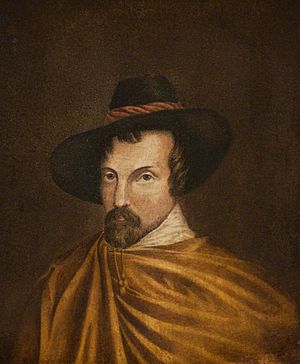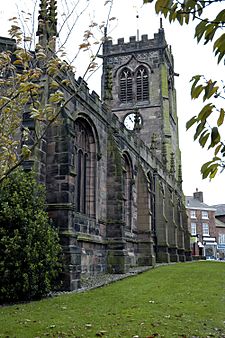First Battle of Middlewich facts for kids
Quick facts for kids First Battle of Middlewich |
|||||||
|---|---|---|---|---|---|---|---|
| Part of the First English Civil War | |||||||
|
|||||||
| Belligerents | |||||||
| Commanders and leaders | |||||||
| Thomas Aston | Sir William Brereton | ||||||
The First Battle of Middlewich was a key fight during the First English Civil War. It happened on March 13, 1643, in Middlewich, England. This battle was between the Parliamentarians, led by Sir William Brereton, and the Royalists, who supported King Charles I of England and were led by Sir Thomas Aston. The Parliamentarians won this battle.
Contents
Why Was the Battle of Middlewich Fought?
In the summer of 1642, the King and Parliament completely split. Both sides started getting ready for war. They tried to gather soldiers and weapons in every county.
Who Were the Main Leaders in Cheshire?
In Cheshire, Sir William Brereton represented Parliament. He tried to recruit soldiers for Parliament. Sir Thomas Aston and other local nobles supported the King. Aston was likely the King's main representative in the county.
The King wanted to build his army at Shrewsbury. He asked his supporters in Cheshire to send their horses and men to Aston. Aston was then to bring these forces to Shrewsbury. However, the King decided to come to Chester instead. From Chester, he ordered people to take weapons and horses from those who supported Parliament. Aston took these supplies and left with the King, leading three groups of horse soldiers.
How Did Sir Thomas Aston Get Involved?
Sir Thomas Aston did well in earlier battles, like the Battle of Edgehill. In January 1643, Prince Rupert called him a colonel. The King then sent Aston as a major-general to Cheshire and Lancashire.
Aston's main job was to gather soldiers in Shropshire. Then, he had to defend Cheshire from Parliament's forces. These forces were coming from London, led by Brereton. Aston also had to take weapons for the King. He was told to stop soldiers from causing trouble or stealing.
Why Was Cheshire So Important?
Both the King and Parliament knew Cheshire was very important. Cheshire is located between the Pennines mountains and the Welsh hills. Controlling Cheshire meant controlling the main north-south route in England.
For Parliament, controlling Cheshire would separate the King's supporters in the north from his main army in Oxford. It would also stop the King from bringing more soldiers from his Irish army through the port of Chester.
Parliament also sent Brereton to Cheshire to gain support. He was to gather and organize people who supported Parliament. He brought small cannons and muskets. He also had an experienced Scottish trainer, Major James Lothian. Brereton had the power to build forts and recruit more men.
What Happened Before the Battle?
When Aston arrived in Shropshire, he found fewer soldiers than promised. He waited two days for more men. During this time, he was ordered to help the sheriff in Stafford. But Aston did not forget his main goal. He told the Cheshire leaders to defend Nantwich and tell him about Brereton's movements. Neither of these orders was followed. Aston did not get the information he needed until it was too late to reach Nantwich before Brereton.
Skirmish at Nantwich
Brereton rode into Congleton on January 27 with about 500 men. He wanted to help Nantwich and make it his headquarters. Nantwich was a good choice because it was wealthy and had many roads leading to different parts of England and Wales.
Brereton sent 50 dragoons (soldiers who ride horses but fight on foot) ahead to take Nantwich. They arrived before Aston. Aston had about 500 men, but he failed to take the town. He retreated eastwards. In a narrow lane, his forces met the rest of Brereton's men. This caused a lot of confusion.
Some of Brereton's dragoons got off their horses, but the horses ran away. The Royalists thought these were charging cavalry. A small cannon was fired, which added to the confusion. The flash and roar scared the Royalists, and they scattered.
Aston ended up in Whitchurch. He said the fight was a draw, but his retreat and calls for help showed it was a defeat. His men were tired, and he didn't get the support he expected from Cheshire. The Royalist leaders could not agree on a single commander. This meant they never had a large enough army to defeat Brereton.
The Road to Middlewich
Aston headed for Middlewich on Friday, March 10. His progress was slowed because his soldiers, who hadn't been paid, refused to move. They received their pay and supplies on Saturday. It was so late that Aston had to leave two groups of horse soldiers to guard the supplies overnight.
It's not clear why Middlewich was chosen. Knutsford would have been safer. Aston knew the dangers of staying in an open town. Enemy forces were in Northwich and Nantwich. Brereton, who was recruiting in Northwich, was surprised by the Royalists' boldness. He thought they were too confident.
Saturday, March 11
Aston arrived in Middlewich with about 500 mounted troops and over 1,000 local soldiers. He also had three cannons. Brereton sent horse soldiers from Northwich to cause an alarm.
Aston received a letter from the Governor of Chester, Sir Nicolas Byron. He said that if Aston protected Lord Brereton's family and goods to Chester, Lord Brereton would provide men for Aston. Even though Aston didn't want to stay long, he decided to wait another day. He sent a letter to Lord Brereton, urging him to act quickly.
Sunday, March 12
Brereton wanted to bother the enemy. He set out with dragoons to cause another alarm at Middlewich. He didn't plan to attack, just to harass them. Meanwhile, Lord Brereton came to Middlewich to talk more with Aston.
Aston thought Lord Brereton's presence led to the Parliamentarian attack. He believed they wanted to stop the Royalists from joining forces. However, Sir William Brereton said he attacked because the Royalist presence in Middlewich was too dangerous to ignore.
Aston decided to stay in Middlewich one more day to talk with Lord Brereton and the sheriff. Realizing the danger, Aston asked for forces from Whitchurch to threaten the Parliamentarians at Nantwich. But these forces had already been disbanded. Aston's fears were correct. Brereton planned a joint attack on Middlewich with the Nantwich forces for the next morning.
The Battle of Middlewich
On Monday, March 13, the Nantwich forces were late. So, Brereton decided to attack with his cavalry and about 200 musketeers. Aston had placed his cannons and men on Sheath Heath, west of the town.
Aston sent some dragoons and horse soldiers to cause an alarm at Northwich. This was meant to draw away some of Brereton's men. But the captain disobeyed orders and fought the enemy. This allowed Brereton's forces to get into one street leading into the town.
In another street, Captain Prestwich's men were surprised. But they fought back and pushed the enemy horse soldiers away. He held a bridge until more foot soldiers arrived. Aston managed to hold off the enemy until about 9 or 10 AM.
The Nantwich Forces Arrive
Then, the Nantwich forces arrived, about 800 foot soldiers and 300 horse soldiers. They came down Booth Lane and entered Newton, at the south end of town. Aston had placed a cannon and 200 trained soldiers there. These soldiers were hidden by ditches and banks.
Aston moved some of his horse soldiers to stop the Nantwich advance. He planned to hide 100 musketeers along a hedge. This would stop the enemy from using the ditches to attack his charging horse soldiers.
However, the Parliamentarians went into the fields on either side of the lane. The Royalist horse soldiers couldn't charge because of the hedges. The musketeers ran away as soon as the first shots were fired. The Royalist horse soldiers were then surrounded and cut off.
Royalist Retreat and Capture
On the west side of town, Mayor Thomas Holme's horse soldiers were holding off the Parliamentarians. But when Sergeant Major Gilmore ordered his foot soldiers to retreat, the horse soldiers were outflanked. They were forced back into the town. Soldiers guarding a breastwork (a low wall for defense) and Waring Bridge also ran away. The Parliamentarians entered the town from there.
The Parliamentarians were moving towards St Michael and All Angels church from three directions. Aston ordered dragoons to defend the churchyard. He also placed a cannon there. He brought up more musketeers to stop the Nantwich force. But these musketeers lay down in the ditches and fired their guns into the air. Aston tried to make them fight, even hitting them with his sword, but it didn't work.
The Parliamentarians charged the Royalist foot soldiers, who ran away. Aston's cavalry was left exposed. They moved to a safer spot. Other Royalist soldiers also ran away without even seeing the enemy. Aston held his cavalry firm until his cannon could be moved. Then, he ordered a retreat to the high street.
Aston went to the churchyard, expecting it to be defended. But he found all the foot soldiers hiding inside the church. He couldn't get even ten musketeers to come out. With his two cannons covering two streets, Aston ordered his cavalry to regroup in a field. But their way was blocked, and they got separated.
Aston found one cannon deserted and another being moved by only one soldier. All the other men were in the church, refusing to come out. Aston was alone. He tried to find his cavalry to fight back. But he lost contact with them. The Parliamentarians had taken the church.
With the church, the Parliamentarians captured many Royalist officers and 400 soldiers. They also took weapons, gunpowder, and two cannons. Brereton believed it was one of the most complete victories since the war began.
What Happened After the Battle?
Sir Thomas Aston's Fate
Aston sent a messenger to gather his cavalry at Rudheath. He planned to meet Lord Brereton for more support. But his cavalry was too far away. So, Aston went alone to tell Lord Brereton what happened. Lord Brereton was still willing to help. Aston returned to Whitchurch to raise more forces. However, those soldiers had been disbanded.
Aston felt that his forces were too small and inexperienced to fight the enemy in an open town. He was sent back to Oxford. He continued to lead a cavalry regiment for the King. He fought in other battles, but probably never returned to Cheshire.
In 1645, Aston was captured by Parliamentarian forces near Walsall. He was taken to prison in Stafford. On March 24, 1646, Aston died from a fever. This fever was caused by his wounds, including a head injury from trying to escape.
Sir William Brereton's Success
Brereton gave credit to God for his victory. He said God gave courage to his soldiers and made the enemy scared.
By late spring, Parliamentarian forces, led by Brereton, controlled most of Cheshire. Brereton became a very important leader in the county. He was strong in military, political, and administrative matters. Some historians believe he had more influence on the outcome of the First English Civil War than Oliver Cromwell.
Brereton suffered only one major defeat, at the Second Battle of Middlewich in December 1643. When peace returned in 1646, Brereton moved to London. He became an active Member of Parliament. As a reward, he received important positions in Cheshire. He spent his later years traveling between his home in Handforth, Cheshire, and a palace in Croydon, Surrey. He died on April 7, 1661.
Images for kids
 | Victor J. Glover |
 | Yvonne Cagle |
 | Jeanette Epps |
 | Bernard A. Harris Jr. |





